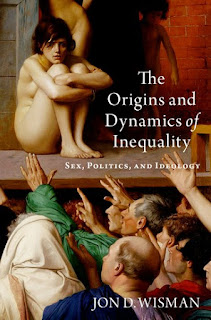 in 2002 and has twice been selected by American University as the Outstanding Teacher of the Year.
in 2002 and has twice been selected by American University as the Outstanding Teacher of the Year.
Wisman applied the “Page 99 Test” to his new book, The Origins and Dynamics of Inequality: Sex, Politics, and Ideology, and reported the following:
Ford Madox Ford’s attributed contention, “Open the book to page ninety-nine and read, and the quality of the whole will be revealed to you," seems, if “quality” is broadly understood, applicable to my book. My book is rich in unfolding complex theoretical relationships in the history of inequality, and on page 99, mention is made of a surprisingly large number of these: the dynamics of the adoption of agriculture, the rise of the state and civilization, sources of status and reproductive success, social formations and degrees of subordination and exploitation, workers’ lack of alternatives, fertility, and population density.Learn more about The Origins and Dynamics of Inequality at the Oxford University Press website.
It would, of course, be too much to expect that the over-arching theoretical framework from which the whole book flows would be randomly captured on its 99th, as opposed to perhaps its first page. The fundamental theoretical claim advanced and supported in my book is that the struggle over inequality has been the underlying force driving human history’s unfolding. This entails a re-interpretation of human history. Underlying the over-arching theoretical claim are two principal supporting claims. The first is that the origins and dynamics of inequality are grounded in evolutionary psychology, or more specifically, Darwin’s theory of sexual selection. The second concerns the dynamics of ideology in legitimating inequality. Although physical force has often been necessary for establishing hierarchical social structures, ideology has always been the most effective day-to-day political weapon enabling elites to present as fair social orders that provide them with disproportionate shares of wealth, income, and privilege. Only since the democratization of the franchise has it become possible that broad popular understanding of the unfairness of elites’ ideology could peacefully reverse inequality.
--Marshal Zeringue



